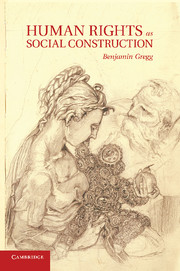Book contents
- Frontmatter
- Contents
- Acknowledgments
- Introduction
- Part I This-Worldly Norms: Local Not Universal
- Part II This-Worldly Resources for Human Rights as Social Construction
- Part III This-Worldly Means of Advancing the Human Rights Idea
- Part IV Human Rights, Future Tense: Human Nature and Political Community Reconceived
- 8 Human Rights via Human Nature as Cultural Choice
- 9 The Human Rights State
- Coda
- References
- Index
9 - The Human Rights State
Published online by Cambridge University Press: 05 January 2012
- Frontmatter
- Contents
- Acknowledgments
- Introduction
- Part I This-Worldly Norms: Local Not Universal
- Part II This-Worldly Resources for Human Rights as Social Construction
- Part III This-Worldly Means of Advancing the Human Rights Idea
- Part IV Human Rights, Future Tense: Human Nature and Political Community Reconceived
- 8 Human Rights via Human Nature as Cultural Choice
- 9 The Human Rights State
- Coda
- References
- Index
Summary
Part II developed two different kinds of resources for human rights as social construction, one cultural and one biological. Now Part IV, in recasting two core elements of human rights, also takes a dual track approach. Chapter 8 followed a biological track with respect to human nature biologically understood; the present chapter pursues a cultural track with regard to the nation-state. The nation-state presupposes nationality, the subject of Article 15 of the UN's Universal Declaration of Human Rights: “Everyone has the right to a nationality.” Is that because the nation-state is the basic unit of social and political membership? Does the possibility of human rights depend on it? Are there alternatives? Kant considers related questions in his 1795 sketch for perpetual peace among states. It distinguishes among three visions of legal status (“types of constitutions”). The first and third focus on individuals; the second, on states. Despite this difference, we might think of them as nested one in the other, like concentric circles. At the center is the individual's legal status, grounded in a “civil right of individuals within a nation.” Move out one circle and we observe multiple states in peaceful coexistence: the “international right of states in their relationships with one another.” Transfer to the outer ring and we find a putative “cosmopolitan right” of “citizens of a universal state of mankind” (Kant 1997:98n). In which of these circles might anyone, anywhere in the world today, recognize his or her political condition? For several centuries now, some people have been fortunate enough to lead lives within the first circle, where they enjoy at least some civil rights. Some live simultaneously within the second circle. Here individuals who carry a politically “strong” passport cross international borders more easily than those with politically “weak” ones, but even here, bearers of weak passports usually circulate more or less freely. Today all states expect all persons, citizen and foreigner alike, to reside in the first circle. Ideally all persons would reside in the second as well, as citizens of one Westphalian state among others, each state recognizing the sovereignty of the others. But who in our world today also resides in that blessed outer circle, the cosmopolitan condition of individual rights penetrating all national borders? Who can even say what it might mean to live in a universal state of mankind? Hundreds of millions of people today inhabit the institutions and political practices of the first and second circles. The third, however, remains obscure in meaning and difficult to imagine in practice; it also remains an idea of abiding fascination.
- Type
- Chapter
- Information
- Human Rights as Social Construction , pp. 212 - 232Publisher: Cambridge University PressPrint publication year: 2011

